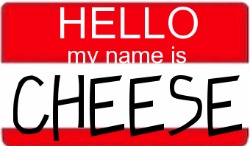Strong brands have haters. All brands should strive to have some.
When I meet somebody new at a party or a social gathering, I usually introduce myself by saying “Hi, my name is Cheese, what’s yours?”
Saying this almost always evokes a physical response. Often it’s a smile, or a laugh. Occasionally it’s a cock of the head. Every so often it’s a roll of the eyes, a head shake, a turn of the back, and a rapid retreat from a crazy person.
I share my nickname because I just hope they think I’m fun loving and interesting enough to talk to. Of course, I am (really, really, I am!), but they don’t know that yet.
Upon hearing my nickname, some people like me and are engaged with me immediately, which is what I hope will happen. Some people, however, are skeptical of me, some mock me or make jokes at my expense (“do you like to CUT the cheese?”). I imagine that those people hate me.
And that’s just the way it should be with a brand. Some of the strongest brands in the world have haters.
The opposite of love is not hate. It’s indifference.
If somebody hates your brand, or attacks your brand, or lambasts your brand, it means that what you stand for or what you advocate is meaningful. For some reason, you've tapped into somebody's emotions. This is a good thing.
A strong brand makes an emotional connection. People are indifferent to a brand that doesn’t make any sort of emotional connection. If they are indifferent, they don’t care. Nobody spends money for something they don’t care about.
Brand managers, or entrepreneurs or solopreneurs (especially those just starting out and just creating a brand for the first time) shouldn’t have a goal of being liked by everybody. Trying to please everybody only ends in doing a lot of different things half assed. That’s a step in the direction towards mediocrity and of becoming something or someone others are indifferent to.
I used to get embarrassed when somebody would react negatively to my name. I remember walking the halls of Stanford Business School before my first year. I was looking for housing and was reading flyers on the wall from other soon-to-be-classmates who were seeking roommates. One of those soon-to-be-classmates asked my name, I answered “My name is Cheese” and he answered without hesitation “Are you serious?” and he laughed and turned and walked away.
I was already somewhat intimidated to be attending Stanford. And here it was that one of the first people I met didn’t like my whimsical nickname. He mocked me for being lighthearted. Rather than embracing the nickname I had already worn for 15 years, I was shamed into being more serious.
I didn’t share my nickname with more than a half-dozen classmates over the next 2 years, despite having a lot of fun with many of those people.
That was a mistake.
I wasn’t thinking about managing my brand identity back then. But what I should have been focused on is being the most authentic Cheese I could be, even if (especially if) that meant being different than those around me.
It’s been almost 20 years since I left Stanford, and you know what? I’m still Cheese. In fact, I’m more Cheese, and more myself than I’ve ever been before.
For those of you who are meeting me for the first time, I hope some of you hate me.


